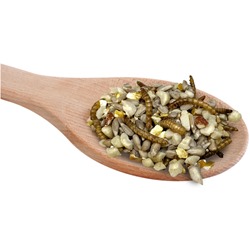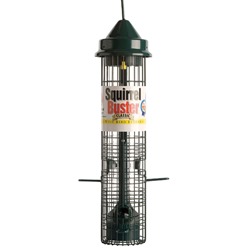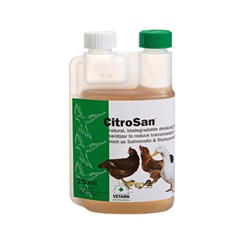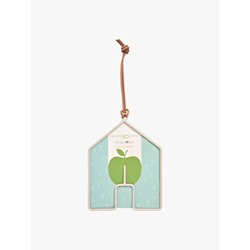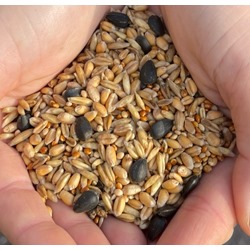So far, April has been a very dry month here on the farm. In fact, we haven't had a single drop of rain all month. This means that our spring barley which we planted in early April badly now needs a drink. Rain is forecast next week and I am sure there will be some mightily relieved growers everywhere when the rainclouds appear.
This year, we have tried direct drilling for the first time and we are very excited about the huge positive impact this type of drilling may have on our farm. You may remember that last November Richard topped off a field of mustard which we had sown after harvest as a 'cover crop' to hold nutrients and moisture in the ground.

Mustard planted after harvest last year and used as a cover crop for this year's naked oats
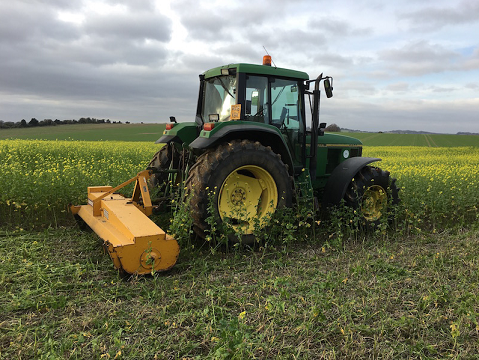
Richard topping off the mustard plant last year
Well, in early April we direct drilled our naked oats into this ground. Direct drilling means drilling directly into un-moved soil. It is a total deviation away from the traditional farming 'norm', which is to cultivate the soil a number of times to create a fine seedbed. The idea behind not cultivating is that the soil worm population and the population of beneficial soil organisms increases and soil moisture is retained ( which has been a real bonus this spring with these dry conditions).
And it is all about the worms! Worms are crucial for soil health, and this method of farming helps to increase the soil population in two main ways; firstly - by not cultivating, the soil isn't turned over exposing the earthworms to the seagulls who then pick them off with ease. Secondly, the worms are not killed by the action of the cultivator. As farm machinery gets more massive and heavier, the soil compaction that big tractors and combines, and heavy cultivators create is considerable, so to overcome this, farmers have to drill deeper, which of course kills more earthworms and so the cycle continues.
So the result of direct drilling and more worms surviving is more ' self-structuring' of the soil - more humus, more organic material, and better water retention. It has been shown that each tillage operation can result in the evaporation of up to 1" of moisture - so retaining this can, over a season, make a significant difference to the growing environment for our plants. So it is a massive thank you to water and worms!
This year we have drilled our naked oats ( which will all be included in our homegrown bird seed mixes) with a ULD New Zealand Cross Slot drill. ULD stands for Ultra Low Disturbance relating to soil disturbance.
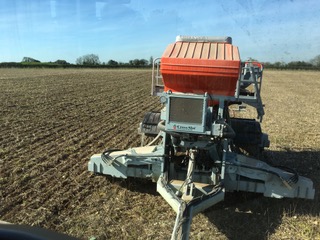
High tech ULD cross slot drill
It neatly and uniquely cuts a horizontal slot and a cross slot ( so an inverted T shape) and then drops the oat seed and fertiliser down the side of the slot.
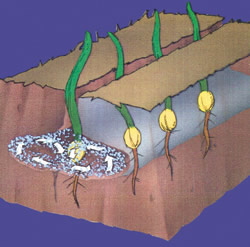
The appliance of science!
This graph compares the emergence of wheat seed using three different types of slots in dry conditions and you can see how much more effective the T shaped slot is in the early days after drilling.
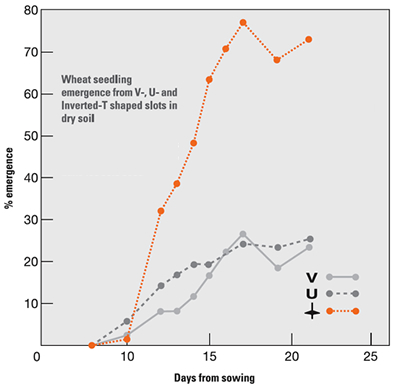
Much faster emergence using an inverted T shaped slot
If the soil is too wet, slugs can easily get into the slot and destroy the seed, so this drill is best used in dry conditions - so has been perfect for us this April!
We drilled the oats on the 3rd April ( into the mustard prepared ground) and this photo was taken on the 20th April - so 17 days later and you can see the naked oats nicely emerged and the remnants of the mustard plants still in situ on the land. Richard is very pleased with how they look.
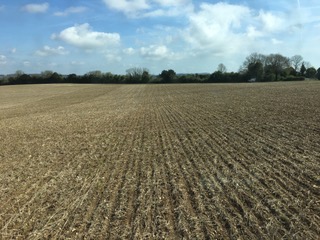
Emerging naked oats - 17 days after direct drilling
This way of farming is a totally new concept and Richard is incredibly excited about the changes we are trialling. It is a leap of faith to change the way you have done something all your life, and I am sure there will be some unforeseen challenges to overcome and mistakes to be made but hopefully not too many!
Our autumn sown crops have come out of the winter looking well. They have gone through their growth stage very quickly and have only slowed this last couple of weeks where it has been so dry and quite cold, but they are much further forward than they would usually be at this date.
Well, hopefully, this has given you an insight into just one of the things we are doing to improve the sustainability and eco-environment of our farm, whilst also producing your great quality bird food!
More next month!
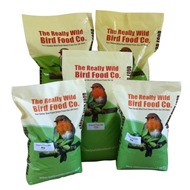
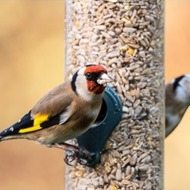 Back
Back Bird Feeders
Bird Feeders  Seed Feeders
Seed Feeders Peanut Feeders
Peanut Feeders Peanut Butter Feeders
Peanut Butter Feeders Suet & Fat Feeders
Suet & Fat Feeders Window Feeders
Window Feeders Hanging Feeders
Hanging Feeders Feeding Stations
Feeding Stations Ground Feeders
Ground Feeders Easy Clean Feeders
Easy Clean Feeders Bird Tables
Bird Tables Seed Trays
Seed Trays Bird Baths & Drinkers
Bird Baths & Drinkers Feeder Accessories
Feeder Accessories Feeder Hygiene
Feeder Hygiene Squirrel Proof Bird Feeders
Squirrel Proof Bird Feeders For the Kids
For the Kids Niger Seed Feeders
Niger Seed Feeders Mealworm Feeders
Mealworm Feeders Bird Food Storage
Bird Food Storage Fat Ball Feeders
Fat Ball Feeders Tube Feeders
Tube Feeders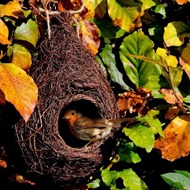

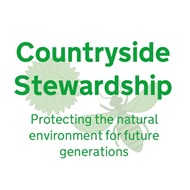

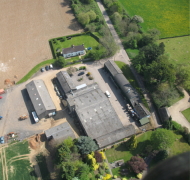 Our Farm
Our Farm Contact Us















